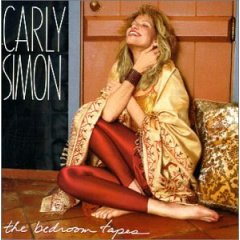Top Qs
Timeline
Chat
Perspective
The Bedroom Tapes
2000 studio album by Carly Simon From Wikipedia, the free encyclopedia
Remove ads
The Bedroom Tapes is the 18th studio album by American singer-songwriter Carly Simon, released by Arista Records, on May 16, 2000.
The album received widespread critical acclaim upon release, and Simon promoted it through many television appearances; notably on Good Morning America, where she performed a concert in Bryant Park on May 19, 2000, which featured songs from the album, as well as some of her classic hits, such as "You're So Vain" and "Nobody Does It Better".[1] Despite the warm reception, the album soon went out of print. In 2002, Simon released autographed limited editions of The Bedroom Tapes, with two bonus tracks: "Grandmother's House" and "Sangre Dolce". The release was limited to only 100 copies. Simon later included "Sangre Dolce" on her 2008 album This Kind of Love.[2] The opening track, "Our Affair", was remixed by Richard Perry and featured on the soundtrack album of the 2000 Don Roos film Bounce, starring Gwyneth Paltrow and Ben Affleck.[3]
On April 6, 2015, Simon re-released the album as a special edition CD with two bonus tracks: "When Manhattan Was a Maiden" and the aforementioned "Grandmother's House". Produced by C'est Music, the re-release was through the Carly Simon Vintage Line, and can be purchased exclusively through Simon's official website.[4]
Remove ads
Reception
Summarize
Perspective
Writing for AllMusic, MacKenzie Wilson said Simon "is as raw as she was on 1975's Playing Possum and just as sweet as 1987's Coming Around Again, but Simon is fresh. Although in her mid-fifties, she is still a charmer," concluding "The Bedroom Tapes is pure, and Carly Simon proves herself to be well grounded. Not that listeners didn't already know that."[5] Similarly, People wrote that the album "unfolds like a one-woman show," calling it a "Boffo performance."[6]
Billboard called the album "A feast for fans of intelligent, richly crafted pop music," and wrote: "With her first collection of original compositions in five years, Simon reminds the young wannabes who continually crib her classic recordings for ideas how it's really done," and concluded "At a time when more simplistic fare dominates the charts, the commercial future of The Bedroom Tapes is hard to predict. But ya gotta love and respect Simon for her commitment to continually raising the creative bar- and for serving as such a strong role model for young tunesmiths."[7]
Rolling Stone called it "A bang up album. Her balance of excellent pop thrills and writing remains singular. The Carly Simon of The Bedroom Tapes shines." NY Daily News called it "one of her best albums", stating "The Bedroom Tapes finds Simon returning to the sharp-eyed commentary and unflinching candor of her best-loved work of the 70's." The Miami Herald wrote "Adults rejoice. Few albums manage to touch the heart and challenge the brain as this gem does." Us Weekly stated "These disarmingly personal songs are pure catharsis. Who needs support groups? The Bedroom Tapes is classy work from one of pop's original confessors."[8]
Remove ads
Awards
Track listing
Credits adapted from the album's liner notes.[11]
"When Manhattan Was a Maiden"
"When Manhattan Was a Maiden" is a song that was the original inspiration and title for what became The Bedroom Tapes. As the concept of the album evolved, Simon ultimately decided to drop the song, and it was never commercially released. In 2002, Simon posted the original demo of the song on her official website for streaming.[12]
The song was included on the 2015 re-release of the album.[4]
Credits
Personnel
- Carly Simon – lead vocals, backing vocals (1, 2, 4, 7, 8), keyboards (1, 2, 4–10), acoustic guitar (1, 4, 7–10), electric guitar (1, 9, 10), percussion (1, 3, 4, 8, 9), guitars (2), bass (2), drum programming (2, 3, 5, 7, 8, 9), congas (3), organ (5, 10), keyboard bass (7, 9), marimba (11)
- Teese Gohl – organ (5), arrangements and conductor (5, 8, 11), acoustic piano (9), all instruments (11), programming (11)
- Andrew Felluss – additional organ (10)
- Stuart Kimball – acoustic guitar (1, 10), electric guitar (1, 9, 10)
- Eric Bazilian – electric guitar (6), keyboards (12), programming (12), guitars (12), bass (12), drums (12)
- Peter Calo – rhythm guitar (2)
- Michael Lockwood – electric guitar (3, 4, 7), acoustic guitar (4)
- T-Bone Wolk – bass (1, 2, 3, 5, 8, 9, 10), acoustic piano (3), electric guitar (3), acoustic guitar (3), dobro (3), mandolin (9)
- Tony Garnier – bass (6)
- Steve Gadd – drums (1, 2, 5, 6, 7, 9, 11), percussion (5, 8, 10)
- Larry Ciancia – drums (3)
- Shawn Pelton – drums (11)
- Mindy Jostyn – violin (8, 10)
- Aaron Heick – saxophone (11)
- Liam O'Maonlai – backing vocals (2, 4, 5, 8), flute (4)
- The Rankin Sisters – backing vocals (2, 4, 5, 7, 8, 12)
- John Forté – backing vocals (3)
- Ben Taylor – backing vocals (3, 8)
Production
- Producers – Carly Simon (Tracks 1–10, 12 & 13); Teese Gohl (Track 11).
- Co-Producers on Tracks 1–10 – David Fields and Frank Filipetti
- Co-Producer on Track 12 – Eric Bazilian
- Engineers – Frank Filipetti, Jimmy Parr, Carly Simon and Ed Tuton.
- Mixed by Frank Filipetti
- Mastered by Mark Wilder
Remove ads
Charts
Album – Billboard (United States)[13]
References
External links
Wikiwand - on
Seamless Wikipedia browsing. On steroids.
Remove ads

